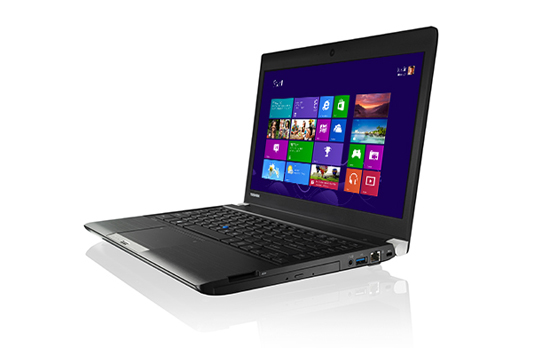Even so, the R30 can make a sturdy and reliable workhorse laptop that will appeal mainly to business users – albeit at a rather high price. The matt-black chassis of the R30 isn’t going to win any awards for elegant design, and the chunky black bezel running above and below the 13.3-inch screen looks distinctly old-fashioned when compared to the thinner surrounds found on more elegant laptop designs. The chassis is made out of magnesium with a shock-resistant ‘reinforced honeycomb’ internal structure that is designed withstand knocks. An internal accelerometer can lock the hard disk to prevent damage in case you drop the laptop accidentally. The R30 is a very chunky 27 mm thick, and certainly is no Ultrabook, although you do get an internal DVD drive in that fat frame. Despite this, Toshiba has managed to keep the weight down to just 1.5 kg, which is light enough to carry around all day without shoulder ache. There are lighter laptops that don’t include a DVD drive – the 13-inch MacBook Air weighs in at 1.35 kg – but if you do need an optical drive then the R30 is one of the lightest options currently available. Connectivity is good too, with HDMI and VGA video interfaces, along with gigabit ethernet for office networks and three USB 3.0 ports. The keyboard feels firm and comfortable, and there’s both a trackpad and a separate pointer located on the keyboard itself. The 13.3-inch screen is something of a mixed bag, though. The lack of touch controls won’t worry too many people, and we were pleased to see that the display’s matt finish does a good job of reducing glare and reflection. However, the 1366 x 768-pixel resolution is somewhat low in laptop costing £900, and while the image is bright and colourful when viewed from directly in front we did find that the viewing angles were limited. The speakers aren’t particularly loud, which means that the R30 won’t be suitable for even close-up presentations until you connect it to a decent screen and loudspeakers. Performance is relatively modest for a laptop in this price range. Our review unit was priced at £900 with an Intel Core i3 dual-core processor running at 2.4 GHz, 4 GB memory and 500 GB hard drive. That combination produced a score of only 2660 points when running the PCMark 7 benchmark test. That suggests it would be adequate for web browsing and running Microsoft Office, but at this price you’d be entitled to expect a solid-state drive to enhance performance. The Core i3’s integrated HD 4600 provides limited graphics performance too, just scraping 25 fps when running our Stalker test at the lower 1280 x 720 resolution. There is another R30 model that includes an Intel Core i5 processor which should lift overall performance, but that takes the price to well over £1200. Battery life is good, though – despite Toshiba web’s site rather carelessly listing it at both 6.5 hours and 9 hours on different pages. The shorter figure is perhaps the more realistic, with Toshiba citing a MobileMark 2012 test. In fact the Toshiba Portégé R30 managed a full 8 hours (484 minutes) in our streaming video test, so careful use may indeed allow it to stretch to 9 hours. The battery is easily replaceable too, as you can just press a couple of buttons on the base of the laptop to pop the pack out, so you can guard against downtime by carrying a spare.

